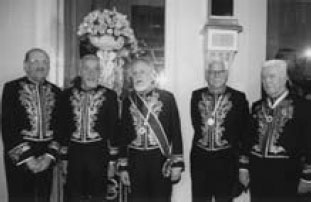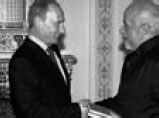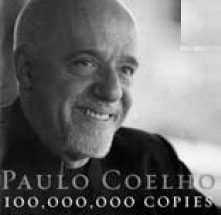Paulo Coelho: A Warrior's Life (33 page)
Read Paulo Coelho: A Warrior's Life Online
Authors: Fernando Morais
Paulo is received by Pope John Paul II in the Vatican, 1998.

Mônica Antunes, Paulo’s literary agent, with Paulo and friends in Dubai.

Paulo and Christina in Prague in 2005 with their gift to the Infant Jesus of a gold-embroidered cloak, fulfilling a promise Paulo made three decades earlier.

Paulo signing books in Cairo, 2005. Egypt is the world’s leading producer of pirate editions of his books.

In 2002 Paulo was chosen as one of the forty lifetime members of the Brazilian Academy of Letters. He is pictured here with four of his fellow ‘immortals’.

Paulo, Marisa Letícia (First Lady of Brazil), Christina and President Lula (left to right) at a state banquet in the president’s honour at Buckingham Palace, 2006.

Paulo meeting Vladimir Putin.

Fulfilling an old dream: Paulo pauses during his journey on the Trans-Siberian Railway, 2007.

The
Sunday Times
journalist Christina Lamb, the inspiration for the character of Esther in
The Zahir
.

The pamphlet commemorating 100 million books sold.
One of the policemen backed him up, assuring Lygia and Pedro: ‘Yes, they’ll be back before you know it.’
As on the outward journey, he sat in the back of the van with an armed policeman on either side and the other two in the front. Halfway there, Paulo asked if they could stop at a public telephone, saying that he needed to tell the recording company that there were some problems with the record. One of the policemen said ‘No’, but calmed him by saying that in a few hours he and Gisa would be free. His plan had not worked: in fact, Paulo had been hoping to call home to ask Gisa to get rid of a jar full of cannabis that was on the bookcase in the sitting room. He sat frozen and silent until they reached the door of the building where he lived. A policeman stayed with the van while the other three went upstairs with him, crowding into the small, slow lift which on that occasion seemed to take about an hour to arrive at the fourth floor. Inside, wearing an Indian sari, Gisa was just turning out the lights, ready to leave, when Paulo came in with the policemen.
‘Sweetheart, these men are from the Dops and they need some information about the record I made with Raul and about the comic strip you and I did for Philips.’
Gisa was a bit frightened, but she seemed to take the matter calmly enough: ‘Fine. Tell me what you want. What do you want to know?’
A policeman said that it didn’t work that way: ‘We can only take statements at the Dops headquarters, so we’ll have to go back there.’
She didn’t understand. ‘Do you mean we’re being arrested?’
The policeman answered politely: ‘No. You’re being detained so that you can provide us with some further information and then you’ll be released. But before we leave, we’ll just take a quick look around the apartment.’
Paulo’s heart was beating so fast he thought he’d have a heart attack: they were sure to find the cannabis. Standing in the middle of the room with his arm around Gisa’s shoulder, he followed the movements of the policemen with his eyes. One of them took a pile of about a hundred
Krig-Ha, Bandolo!
comic strips, while another rummaged through drawers and cupboards, and the third, who seemed to be the leader, scrutinized the books and records. When he saw a Chinese lacquered jar the size of a
sweet tin, he picked it up, took off the lid and saw that it was full to the brim with cannabis. He sniffed the contents as though savouring a fine perfume, put the lid back on and restored it to its original place. It was only then that Paulo realized that the situation was infinitely worse than he had supposed: if the policeman was prepared to overlook a jar of cannabis, it was because he was suspected of far graver crimes. The Ponta Grossa incident came to mind: could it be that he was once again being confused with a terrorist or a bank robber?
It was only when they arrived at the Dops headquarters that he and Gisa realized that they would not be dining with his parents that evening. They were separated as soon as they arrived and ordered to exchange the clothes they were wearing for yellow overalls with the word ‘PRISONER’ written in capital letters on the top pocket. During the night of the twenty-eighth they were both photographed and identified and fingerprinted for the police files that had been created in their names; Paulo’s number was 13720 and Gisa’s 13721. They were then interrogated separately for several hours. Among the personal items confiscated along with their clothes were their watches, which meant that they lost all idea of time, particularly in the circumstances in which they found themselves–imprisoned in a place where there was no natural light.
The interrogation did not involve any physical torture and mainly had to do with the psychedelic comic strip that accompanied the
Krig-Ha, Bandolo!
LP and what exactly was meant by Sociedade Alternativa. This, of course, was after they had spent hours dictating to clerks what in the jargon of the Brazilian police is called the
capivara
–a careful, detailed history of a prisoner’s activities up to that date. When Paulo said that he had been in Santiago in May 1970 with Vera Richter the police pressed him for information on Brazilians who lived there, but he had nothing to tell them, for the simple reason that he’d had no contact with any Brazilian exiled in Chile or anywhere else. Gisa, for her part, had a problem convincing her interrogators that the title of
Krig-Ha, Bandolo!
had come up during a brainstorming session at Philips when Paulo, standing on a table, had bellowed out Tarzan’s war cry.
In Gávea, the Coelhos were frantic with worry. With the help of a friend, the secretary of the governor of what was then the state of
Guanabara, the journalist and businessman Antônio de Pádua Chagas Freitas, Lygia managed to find out, to everyone’s relief, that her son had been arrested by the Dops and was being detained in their prison in Rua da Relação. This was some guarantee, however flimsy, that he would not join the list of the ‘disappeared’. Since
habeas corpus
no longer existed, all they could do was to try to find people who might have some kind of link, either family or personal, with influential individuals in the security forces. Paulo’s brother-in-law, Marcos, suggested seeking the help of a friend, Colonel Imbassahy, who had connections with the SNI (Brazil’s National Intelligence Service), but Pedro decided to try legal routes first, however fragile these might be. It was Aunt Helói who suggested the name of the lawyer Antônio Cláudio Vieira, who had worked in the offices of ‘Uncle Candinho’, as the Coelho family called the ex-procurator general of the Republic, Cândido de Oliveira Neto, who had died a year earlier.
By five in the afternoon, they were all at the door of the prison. When he was told that only the lawyer, Vieira, could enter, Pedro mentioned that he knew one of the stars of the dictatorship. ‘We’re friends of Colonel Jarbas Passarinho.’ He was speaking of the ex-governor of Pará, who had held ministerial positions in three military governments (he had been one of the signatories of the AI-5) and had been re-elected senator for Arena, a party that supported the regime. The policeman was unimpressed, saying that even someone in Jarbas’s position had no influence in Dops.
While the lawyer was trying to get news about Paulo from the officer on duty, Pedro, Lygia, Sônia and her husband Marcos had to wait on the pavement in the drizzle.
After some minutes, Vieira came out with good news: ‘Paulo is here and should be released today. The officer in charge is phoning his superior to see whether they will allow me to see him for a few minutes.’
The lawyer was summoned by the doorman and taken to a room where he would be allowed to speak to Paulo briefly. He was shocked by Paulo’s appearance: while he hadn’t been the victim of any physical violence, Paulo was very pale with dark rings under his eyes and had a strange zombie-like expression on his face. Vieira reassured him, saying he had been given a promise that he would be freed in the next few hours. And that was that. Lygia insisted that they remain on the pavement
outside the Dops until her son was released, but the lawyer dissuaded her from this idea.
At about ten o’clock on the Tuesday night, one of the policemen, who had always seemed to Paulo to be the most sympathetic and least threatening, opened the cell door and gave him back the clothes and documents he’d had with him when he was arrested: he and Gisa were free to go. Paulo dressed quickly and met Gisa in the lobby, and the policeman accompanied the couple to the café next to the Dops, where they smoked a cigarette.
Anxious to get away from such a terrifying place, Paulo hailed a taxi and asked the driver to take them to his parents’ house in Gávea. The driver set off; then, as the cab was travelling at speed past Hotel Glória, it was brought screeching to a halt by three or four civilian vehicles, among them two Chevrolet Veraneio estate cars, which at the time were the trademark vehicle used by the security police. Several men in plain clothes jumped out and opened the two rear doors of the taxi in which the couple were travelling and dragged Paulo and Gisa out by force. As Paulo was handcuffed and dragged along on his stomach across the grass, he caught sight of Gisa being thrown into an estate car, which drove off, tyres squealing. The last thing he saw before his head was covered in a black hood was the elegant white building of the Hotel Glória, lit up like fairyland.
Once in the back seat of the car, Paulo managed to murmur a question to one of the men with him: ‘Are you going to kill me?’
The agent realized how terrified he was and said. ‘Don’t worry. No one’s going to kill you. We’re just going to interrogate you.’
His fear remained undiminished. His hands shaking, Paulo was able to overcome his fear and shame enough to ask his captor: ‘Can I hold on to your leg?’
The man seemed to find this unusual request amusing. ‘Of course you can. And don’t worry, we’re not going to kill you.’